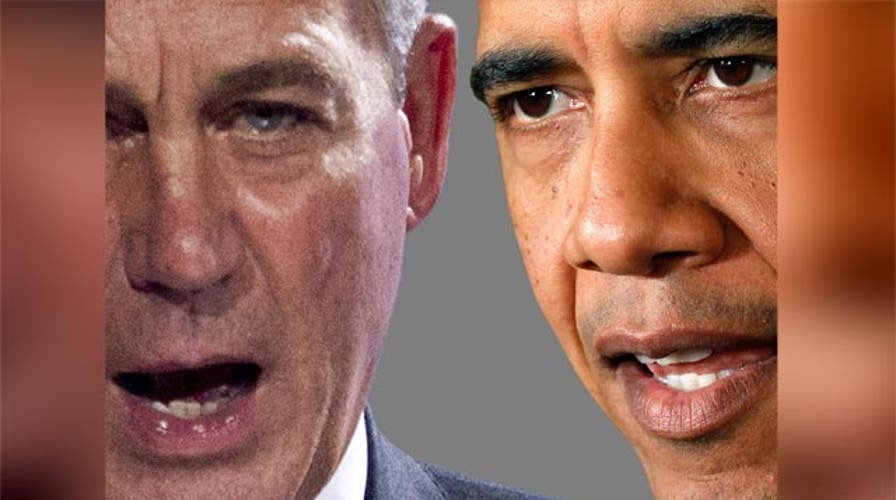Dems, GOP posturing our way off fiscal cliff?
White House and House Speaker Boehner met for first time in weeks, but fiscal cliff deadline may be approaching sooner than expected
The deadline for resolving the fiscal crisis could be much closer than previously thought.
Because of the head-spinning legislative logistics involved in crafting and passing a bill, congressional Republicans and the White House really would have to get the ball rolling on a deal this week if they want to pass something by Jan. 1.
Officials have been scrambling for weeks in hope of writing some alternative package to avert the sweeping set of tax hikes and spending cuts poised to go into effect at the beginning of January. But despite possible signs of progress -- namely, a face-to-face meeting Sunday afternoon between President Obama and House Speaker John Boehner -- the two sides have just a matter of days to work things out.
That's because both sides will need to account for the time it takes to actually bring the bill to the floor. Here's the kind of timetable the chief negotiators could be dealing with:
Even if Obama and Boehner somehow strike a deal by mid-week, it would take several days to write the legislation and additional time to send it over to the Congressional Budget Office so they can estimate how much deficit reduction it entails.
This means lawmakers probably would not have a piece of written legislation until this weekend at the earliest.
From there, both sides would have to get to work selling members of their own party on the package. This would be no easy feat. On the left, many Democrats are resistant to any serious cuts to entitlements. On the right, many Republicans are resistant to tax increases -- which Obama is demanding as part of any deal.
Further, even if Boehner and Obama figure out what to do with the expiring Bush tax rates and the automatic spending cuts, congressional leaders are faced with a string of other prickly questions. They still have to decide whether to extend lower-profile items like long-term unemployment aid, and whether to include in any package the supplemental spending request for Superstorm Sandy victims. The requested amounted, as of Friday, was $60 billion.
Capitol Hill rules pose further problems. Because any package will contain spending and tax language, the bill must start on the House side, according to the Constitution. House Republicans, though, impose a so-called "three-day rule," meaning legislation has to wait for three days before the House will consider it.
That puts lawmakers well into next week to even get a bill to the House floor. From there, it would still have to come back to the Senate, where a new set of problems could arise -- namely, Republican lawmakers opposed to the package could choose to force the rest of the chamber to break two filibusters, adding even more time to the process. It could take until after Christmas for the Senate to do its part.
Finally, any differences between the two chambers' bills would have to be resolved before a final version heads to the president's desk.
It's possible that, to buy some time, lawmakers could craft a short-term bill holding off the tax hikes and spending cuts. Leaders, though, would still need to corral enough support to pass such a bill.
It remains unclear how far along talks might be. En route to a stop Monday in Detroit with President Obama, White House Press Secretary Jay Carney was mum when asked about the details of Obama's and Boehner's meeting a day earlier.
He reiterated that Obama thinks Republicans need to allow rates for the top 2 percent to rise.
Boehner last week put a counter-proposal on the table that included $800 billion in revenue increases over the next decade. While Boehner cast that as a significant concession, Obama said it didn't go far enough because it didn't include an increase in tax rates for the top 2 percent.
Boehner, though, is facing some pressure from Republicans to give a little bit more.
The speaker is effectively caught between two competing wings of the Republican Party. Some say Congress should not raise any taxes, and were disappointed he went so far as to put any revenue on the table. However, a growing number of Republicans are suggesting the party should give Obama what he wants on tax rates -- and focus instead on winning entitlement cuts once that is cleared away.
Sen. Bob Corker, R-Tenn., became the latest Republican to open the door to tax rate hikes during an interview on "Fox News Sunday."
"There is a growing group of folks that are looking at this and realizing that we don't have a lot of cards as it relates to the tax issue, before year-end. I mean, we have one house, that's it," Corker said.
Corker suggested that Republicans instead focus on extracting entitlement cuts as part of the debt-ceiling negotiations.
"Republicans know that they have the debt ceiling that's coming up right around the corner, and the leverage is going to shift, as soon as we get beyond this issue," Corker said on "Fox News Sunday." "The leverage is going to shift to our side, where hopefully we'll do the same thing we did last time."
Fox News' Chad Pergram contributed to this report.





